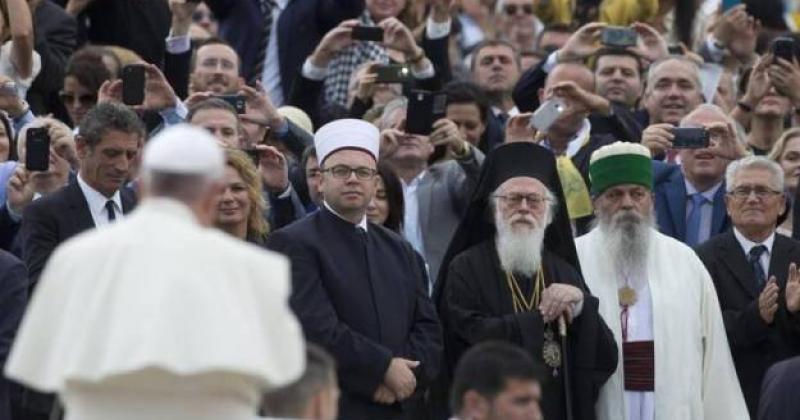On Sunday afternoon, September 21, Pope Francis met with leaders of Albania’s religious communities. During the meeting he spoke about the “insidious enemy” of a widespread intolerance towards those with different religious convictions. He said that the starting point for dialogue must be our own identity, otherwise we risk relativism.
By Andrea Tornielli
“Authentic religion is a source of peace and not of violence! No one must use the name of God to commit violence! To kill in the name of God is a grave sacrilege. To discriminate in the name of God is inhuman.” Francis said this during his meeting with religious leaders at the Catholic University “Our Lady of Good Counsel” in Tirana. The leaders of the five major religious communities present in the country – Muslim, Bektashi (an Islamic Sufi confraternity), Catholic, Orthodox and Evangelical – attended. Francis reminded them that “Albania sadly witnessed the violence and tragedy that can be caused by a forced exclusion of God from personal and communal life.”
“When, in the name of an ideology, there is an attempt to remove God from society, it ends up adoring idols, and very soon men and women lose their way, their dignity is trampled and their rights violated. You know well how much pain comes from the denial of freedom of conscience and of religious freedom, and how from such a wound comes a humanity that is impoverished because it lacks hope and ideals to guide it,” Francis said.
“The changes that have come since the 1990’s have had the positive effect, among other things, of creating the conditions for an exercise of authentic religious freedom,” the Pope continued. “This has made it possible for each community to renew traditions which were never really extinguished, despite ferocious persecution. With this religious freedom has come also the possibility for every person to offer, according to their own religious convictions, a positive contribution; firstly, to the moral reconstruction of the country and then, subsequently, to the economic reconstruction.”
Francis reminded religious leaders that on his visit to Albania in 1993, John Paul II had said that “religious freedom […] is not only a precious gift from the Lord for those who have faith: it is a gift for each person, because it is the basic guarantee of every other expression of freedom […]. Only faith reminds us that, if we have one Creator, we are therefore all brothers and sisters. Religious freedom is a safeguard against all forms of totalitarianism and contributes decisively to human fraternity.”
“We cannot deny that intolerance towards those with different religious convictions is a particularly insidious enemy, one which today is being witnessed in various areas around the world. All believers must be particularly vigilant so that, in living out with conviction our religious and ethical code, we may always express the mystery we intend to honour. This means that all those forms which present a distorted use of religion, must be firmly refuted as false since they are unworthy of God or humanity.”
But “ religious freedom is not a right which can be guaranteed solely by existing legislation, although laws are necessary. Rather religious freedom is a shared space, an atmosphere of respect and cooperation that must be built with everyone’s participation, even those who have no religious convictions.”
The Pope then outlined two attitudes to help advance this fundamental freedom: “[to regard] every man and woman, even those of different religious traditions, not as rivals, less still enemies, but rather as brothers and sisters.” “When a person is secure of his or her own beliefs, there is no need to impose or put pressure on others: there is a conviction that truth has its own power of attraction.” “We need each other, and are entrusted to each other’s care. Each religious tradition, from within, must be able to take account of others.”
The second attitude involves a commitment towards the common good. “Whenever adherence to a specific religious tradition gives birth to service that shows conviction, generosity and concern for the whole of society without making distinctions, then there too exists an authentic and mature living out of religious freedom. This presents itself not only as a space in which to legitimately defend one’s autonomy, but also as a potential that enriches the human family as it advances. The more men and women are at the service of others, the greater their freedom!”
The Pope called for special attention to be paid to the “many poor and needy people” as well as for efforts “to find a more inclusive way of social justice and path of economic development.” “Men and women, inspired in these areas by the values of their respective religious traditions, can offer an important, and even unique, contribution. This is truly a fertile land offering much fruit, also in the field of inter-religious dialogue.”
In his opening greeting, the Archbishop of Scutari, Angelo Massafra, said: “it is time to move from tolerance to fraternity.”
In an off-the-cuff comment at the end of his speech, the Pope said: “One principle is clear: the starting point for dialogue has to be one’s own identity; otherwise it would be a ghost dialogue! Each of us has our own personal identity. We must walk together without feigning a different identity, or this would be relativism; it would be hypocrisy. We have life in common, as well as goodwill to ensure our brothers’ wellbeing and each one of us bears witness to our own identity.” During his address, Francis looked at the group of religious figures around him and joked: “this looks a bit like a football team, Catholics on one side and everyone else on the other side.”
